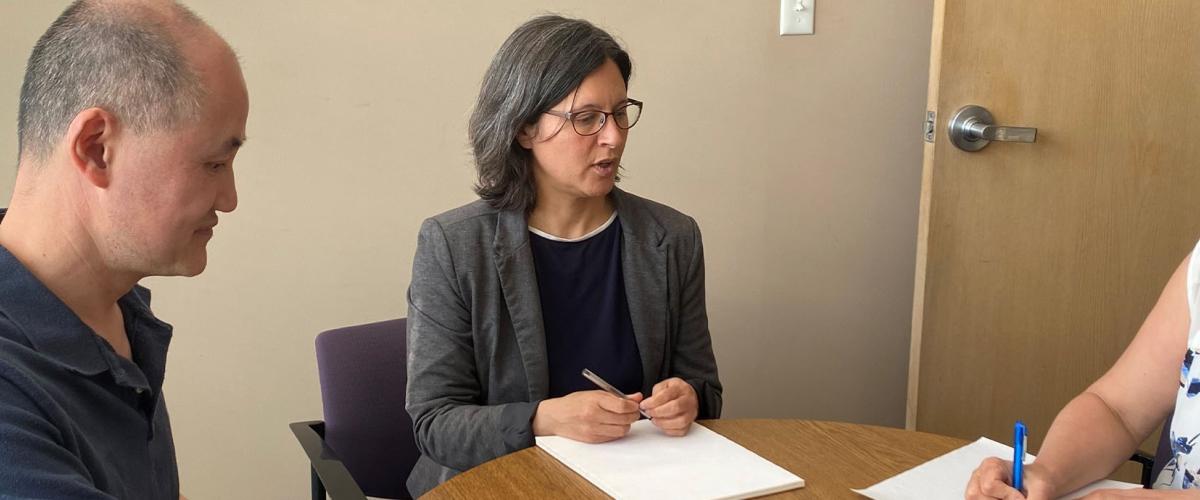Post-Hire Training
To be trained as a family justice counsellor (dispute resolution) you must first be successful in getting a position with the Family Justice Services Division, Ministry of Attorney General and then you will be enrolled in the training program for the first 6 months of your employment. The family justice counsellor training program includes various online courses, in-person webinars and a 6-month practicum concluding with the successful completion of the Family Mediation Canada (advanced) certification process. The training is fully funded by the Ministry of Attorney General.
Career Overview
Family justice counsellors (FJCs) are professionally trained and accredited mediators. They assist families in making important decisions around their children when experiencing separation or divorce. Family justice counsellors work in Family Justice Centres and Justice Access Centres throughout British Columbia and are employed by the B.C. Ministry of Attorney General, Family Justice Services Division.
Family justice counsellor can help parents resolve disagreements without going to court and can assist with documenting arrangements through Written Agreements and Consent Orders.
FJCs are trained to provide:
- mediation services for family-related matters such as guardianship, parental responsibilities, parenting time, contact with a child, child and spousal support and ownership of companion animals (pets)
- a forum for children and youth to provide their views and articulate their voice in mediation, and an opportunity for parents to hear and consider the information from their children when making decisions
- information and assistance about obtaining or changing a family-related agreement or court order
- information about and calculations under the Federal Child Support Guidelines and Spousal Support Advisory Guidelines
- emotional support
- referrals to emergency, legal and community services
Career Details and Opportunities
Family justice counsellors serve families across the province at Family Justice Centres and Justice Access Centres. Their services are provided free of charge to parents and other family members. Their annual salary ranges from approximately $71,771.66 to $89,268.45.
More information about family justice in BC is available on the BC government’s Family Justice webpage.
Family Justice Counsellor career opportunities can be searched through the BC Government Jobs Posting website.
Personal Qualifications
Skills:
- active listening
- questioning and clarifying to identify underlying interests
- emotional intelligence
- empathy
- strong ethics
- strong writing and verbal abilities
Abilities:
- remain impartial
- be non-judgmental
- work with a diverse population
- manage sensitive and confidential information
- work in a highly emotional setting
Minimum Requirements to Apply
- A Canadian citizen or landed immigrant
- A recognized undergraduate degree
- Completion of 80 hours of conflict resolution courses with the focus on mediation skill development. Consideration may be given to applicants who have less than 80 hours of conflict resolution courses
Note: Applicants who obtained their degree outside of Canada must have their “foreign degree” evaluated through the International Credential Evaluation Service (ICES). Definition of “foreign degree” is any degree outside of Canada.
Note: The recommended Justice Institute of British Columbia (JIBC) courses are offered by the Centre for Conflict Resolution and they include:
- CRES -1100 Foundations of Collaborative Conflict Resolution
- CRES-1170 Negotiation Fundamentals: Collaborative Problem Solving
- CRES-1181 Mediation Fundamentals: Facilitating Conflict Resolution
- CRES-1105 Navigating Intense Emotions in Conflict
- CRES-1410 Advanced Mediation (formerly Mediation Skills Level II-CRES-1280, CCR290 or CR400)
Note: If the applicant’s conflict resolution courses are not from JIBC, a prior learning assessment may be required to determine if an applicant meets this qualification.
- Minimum of one-year related experience* in a human service field (e.g., Indigenous organizations and community services, counselling, community service agencies, employment assistance, dispute resolution, court services, legal services).
*Note: Experience may be gained in a professional/work, community or volunteer setting.
Although family justice courses are not a mandatory when applying to a family justice counsellor posting, it can be advantageous for an applicant to take some or all of these courses before their interview. These family justice courses include:
- FAMJ-1000 Family Justice Services in B.C.
- FAMJ-1002 Family Violence: Impact on Separation and Divorce
- FAMJ-1005 Effects of Separation and Divorce on Adults
- FAMJ-1006 Effects of Separation and Divorce on Children
- FAMJ-1009 Child Support Guidelines
- FAMJ-1018 Diversity, Family Dispute Resolution, and Access to Justice
- FAMJ-1019 Substance Use in Family Justice
- FAMJ-1026 Mental Health Considerations in Family Justice
Learn more about family justice courses.
Programs
Explore programs in this area of study
